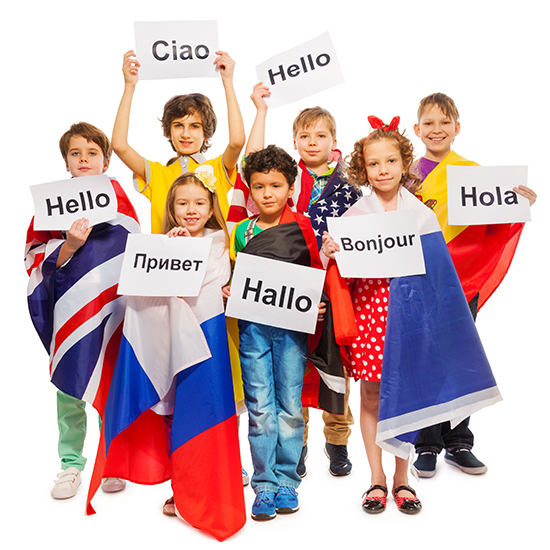Many people believe that when you move to a different country, you should try to exclusively practice the host country’s language in order to learn that language faster. This notion has also been adopted in many schools across the world. However, is this really the best approach?
A monolingual approach in schools has been vastly adopted for a long time now and, oftentimes, has resulted in many international parents and their children feeling excluded or even embarrassed to use their home languages. However, over the past years we have seen a positive shift towards including languages in schools more and there are many good reasons why. Here are some of the most important ones:
Language as cultural identity
Language is an inherent piece of who we are. A valuable part of our identity. The more we explore and develop our languages, the more we develop a sense of belonging and self-value and this is of crucial importance to our children’s wellbeing and success when it comes to their personal and academic development.
Multilingualism and brain
Extensive research on the impact of multilingualism on the brain has proven that multilingual people’s brains do function differently and in a more advantageous way compared to monolingual people in areas such as complex thinking, mental flexibility, communication and interpersonal skills, and even reduced risk of age-related mental diminishment conditions.
Home languages benefit the learning of more languages.
Dr. Jim Cummins, a prominent researcher in bilingual education, has stated that developing language repertoires at the same time, actually accelerates and deepens understanding and acquisition of languages already mastered, but also of more, new ones.
Ready for the global community
Multilingual individuals are more prepared for the global community, as they are able to communicate with an open and flexible mind, having possibly been exposed to various cultures. Is this not a goal worth pursuing?
Language skills and structures, as well as concept knowledge, many times, already exist in the children’s educational toolkit, and the only thing missing is the words in the new language to prove it. I am sure, if you are an international living outside your home country, you probably have experienced a situation in which people are talking about a certain matter that interests you and you know a lot about, but the language spoken is one you have not yet mastered. If you were given the opportunity to talk and write about it in your own language, would you feel more confident and included? Do you think you could have contributed to these conversations? Maybe if you were reading a text translated in your language with the foreign language next to it, you would be able to understand some words? Maybe sentence structures? The answer to all the above questions is yes, and this is exactly how it works for multilingual children as well.
Language Friendly School
Optimist International School, an international primary school, recently became a Language Friendly school. This means that all languages spoken by students are welcome and valued.
In our classes we allow students to use the languages they feel most comfortable with in order to show their understanding and develop their skills, while we try to methodically use their languages to support the development in English, as well. For this purpose, children can read, write and do research in their own language, while teaching staff guide them to create links between their languages for deeper and effective acquisition.
Moreover, we often use the childrens’ languages in various aspects of school life, such as greeting them in the morning, asking children to translate keywords in their languages for us to learn or even learning to sing ‘happy birthday’ in all the different languages we have in school.
The smile, confidence, and safety that the children feel in our school by feeling included, respected, and valued is what fuels our teaching and learning. The results in children’s academic and personal development are outstanding as they can be themselves, navigate through their cultures and identities, while being respectful and tolerant of others.
Multilingualism is an asset and we, as a school of multilingual and intercultural educators, are committed to promoting and improving our multilingual approaches in order to support happy, respectful, inquisitive global citizens.
Written by Valentina Spyropoulou
For more information: www.optimist-international-school.nl
